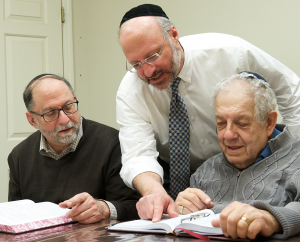When Yisro comes to meet Moshe and the Jewish Nation, he finds that Moshe is taking questions all day. Moshe explains that everyone who has a question about G-d’s Laws is coming to him for the answer, and everyone with a disagreement is coming to him to know who is right.
Yisro says to him that the burden is obviously too great for one person. Rather, he suggests that Moshe select judges for the nation, “judges of thousands, judges of hundreds, judges of fifties, and judges of tens” [Ex. 18:21].
Even in the desert, it wasn’t enough for there to just be Moshe, teaching the people. It had to be possible for every person to make a connection with a teacher, who could show him right from wrong. If the question was too great for the “judge of tens,” he could turn to the “judge of fifties” for the answer.
Both Moshe and Yisro were motivated by the good of the people, rather than their leader. The entire model was (and remains) one of service to the community. As Yisro said, the judges had to be upstanding, G-d-fearing individuals, people of truth who were not anxious for personal gain. Over the long term, he knew this would be even more beneficial than rare contact with Moshe himself.
The Talmud frequently points out that not everything we learn is black and white, something that one can find in a book or by listening to a lecture. The opportunity to develop a personal connection with the teacher means the opportunity to learn from simply being in their presence, and seeing how they address everyday situations. It is important to connect with a teacher and guide, a link back through Jewish history, to truly understand the majesty of our birthright.





I am struck by the idea that Yitro is offering not only very bright suggestions how to properly handle all of this people who come for answers but in addition he even offers a definition of what should be the standard for judges.
Yashar Koach. Shabbat shalom
Yes, Yitro was a Priest of Midyin / Midian. Amein.